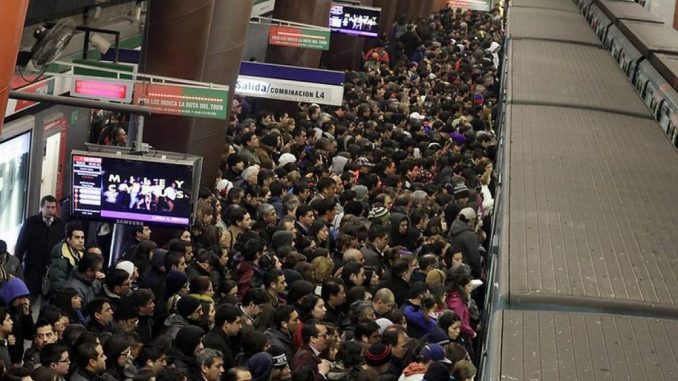
The Labor Reform that the government tries to impose, has opened a debate about the work day. In turn, the idea of legislating a reduction of the working day from 45 to 40 hours per week has activated. This has created a controversy in which businessmen, Congress and the government express their positions. Although at institutional levels much of the debate is about economic growth and productivity, many positions would make welfare, the right to free time and real working conditions in our country disappear.
What the government wants
During these days, the government began a media campaign to drive its proposal of labor flexibility, arguing for integration of social sectors into the labor market and compensation in family life. In Piñera´s words: “the work day is distributed very rigidly by the law, it can be distributed only between 5 and 6 days and full of norms, in circumstances in which modernity is precisely trying to makes the world of work more compatible with the world of the family; and in this way, labor flexibility, that one can accommodate his or her schedules (…) should be allowed to the extent that free and voluntary agreements are reached between the parties, something that the current legislation impedes in an extreme way ”.
For this, they include the integration of the possibility of distributing the 180 hours per month in up to 12 hours per day, to the Labor Code. Therefore, this “improvement” would allow the elimination of holidays and the relative stability of work days. An intensification of work rates without talking about wage increases. Another issue that is included is the elimination of compensation for years of service, justified as a measure to incentivize new job opportunities, because when there is compensation workers do not change companies. Absurd.
The Labor Reform (which proposes a series of measures) is a central part of the government´s plan, together with the pension and tax reforms, being part of the route proposed in the midst of a devaluation cycle of the world economy and local economic stagnation, therefore symptomatic of the tendency to make labor rules more flexible with the intention of recovering the profitability of large capitalists.
The dilemma of the parliamentary opposition.
At the same time, a couple of years ago, Communist Party deputy Camila Vallejos, had raised the idea of legislating the reduction of the working day from 45 to 40 hours per week, arguing that the productivity of developed countries has been maintained while working hours have been reduced. This idea has reemerged, supported by the Frente Amplio in the midst of the discussion of the labor reform, a proposal that aims to be transversal in parliament, based on the example of the Lagos government, that decreased the work week from 48 to 45 hours without reducing salaries or business productivity.
In fact, it would mean working 8 hours a day, 5 days a week. Businessmen raise their voices in opposition and the UDI through Patricio Melero tried to censor the President of the Labor Commission, Gael Yeomans (Convergencia Social – Frente Amplio). Therefore the right and the business sector will raise all objections in their favor, being the parliament a place where they feel comfortable.
That dilemma crosses the Communist Party and the Frente Amplio, because by institutional means the dialogue involves sectors of the government. The CP, who was the promoter of the idea, leads the CUT trade union central, absent from each labor conflict and silent on the labor reform, while the FA prioritizes agreements in parliament, a similar position between both sectors that promote ideas without motorizing mobilization, on the eve of a new electoral map.
Reduction and distribution of working hours and time to live
Until now, the equation is “live to work”, even decreasing working hours to 40 per week, we would continue to be among the countries with the longest hours, not counting the hours of commute and domestic work. For our part, we believe that the right to decent work is something basic, as is an income that is equal to the real cost of living.
Though they are basic rights, any modification in favor of workers means touching the interests of the capitalists, leading to a confrontation and antagonistic dispute. A utopian scenario would be to think that businessmen and their representatives would agree to reduce their profits. If this was possible, the passivity of the CP and the FA would be justified, but this has not happened, on the contrary, it has allowed the advance of precarious measures.
So our proposal is equivalent to transforming “live to work” into “work to live,” a salary equivalent to what is needed, while distributing work among all workers as a measure against unemployment and for full employment: reduce work to 6 hours a day, 5 days a week. In addition, socially absorb reproductive and care work, all this to have free time available for individual and social pastimes. Majority rights that capitalism makes impossible to impose.
All this diagram of our proposal of basic and elementary aspirations is possible in the democratic activity of the workers making public the production planning, therefore touching all the interests of the capitalists and confronting them without half measures, with revolutionary organization that is ready to think new horizons: anti-capitalist, feminist and democratic, that is why we build a tool that is disposed to all this and more as perspectives for a new society.
Iván M.
Anti-Capitalist Movement.








